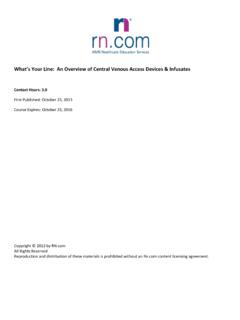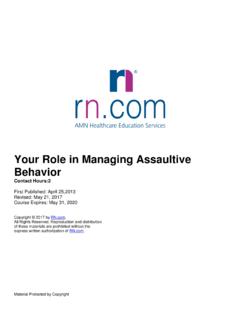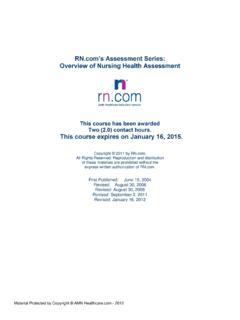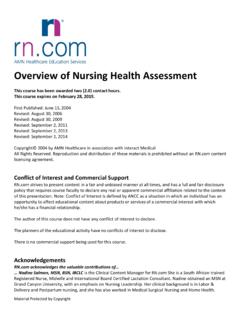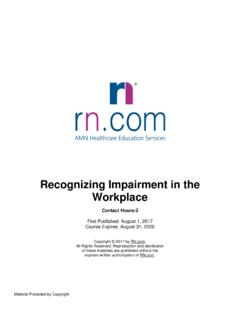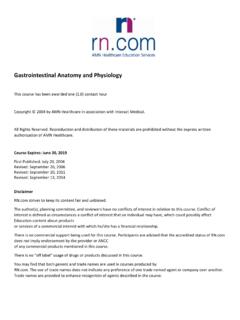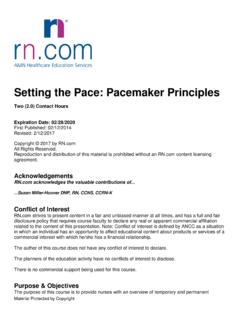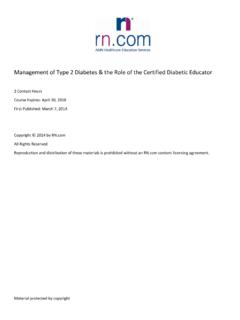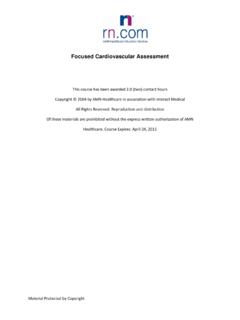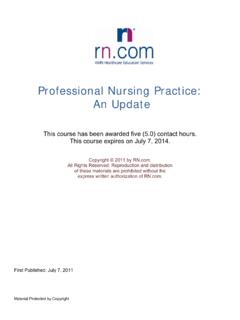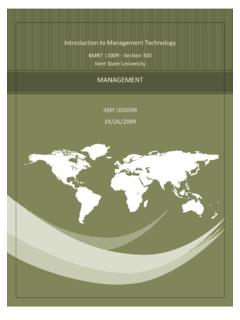Transcription of Professional Documentation: Safe, Effective, and Legal
1 Material protected by Copyright Professional documentation : Safe, Effective, and Legal 6 Contact Hours Copyright 2009 by All Rights Reserved Reproduction and distribution of these materials is prohibited without the express written authorization of First Published: February 20, 2009 Revised: June 1, 2012 Course Expires: October 24, 2015 Acknowledgments acknowledges the valuable contributions Bette Case Di Leonardi, PhD, RN-BC, author of this continuing education course. Bette has been adventuring in nursing, education, and healthcare administration for more than 40 years. Today, she practices as an independent consultant who assists her clients to achieve their goals using educational, competency management, and quality improvement strategies. Her clients include a variety of healthcare organizations: Professional schools, Professional organizations, a temporary staffing company, disease management companies, managed care organizations, a public health department, and providers of continuing nursing education.
2 She publishes and presents live workshops, and web-based courses on a variety of Professional and educational topics including precepting, teaching and learning, critical thinking, test construction, medication safety, delegation, career development, advocacy, and assertiveness. She has written knowledge assessment tests for several healthcare organizations and developed and teaches a test and measurements course in a doctoral program. She was among the first group of nurses certified in Nursing Professional Development in 1992. She is a charter member of the National Nursing Staff Development Organization (NNSDO), served as its membership chairperson for 10 years, and currently chairs the Products & Services Committee. She is a member of the ANCC Content Expert Panel for Nursing Professional Development and is a board member of the National Board for Certification of Hospice and Palliative Nurses.
3 She serves on the editorial board of The Journal of Continuing Education in Nursing. Prior to establishing her consulting practice she held leadership positions in the nursing department at Material protected by Copyright Michael Reese Hospital and Medical Center (MRHMC) in Chicago, illinois . At MRHMC she served on the faculty and administrative staff of the Michael Reese School of Nursing, directed the departments of Nursing Education, Evaluation and Research, Critical Care Nursing, and Emergency Department Nursing. She developed a hospital-wide education department to serve 3,500 staff members. In addition to mandated educational programming, specific initiatives during her tenure in the education leadership role included management development, unit-based quality improvement, and preceptor development.
4 Bette earned her BSN at Syracuse university in Syracuse, New York, and her MSN and PhD in Educational Psychology at Loyola university Chicago, Chicago, illinois . Disclaimer strives to keep its content fair and unbiased. The author(s), planning committee, and reviewers have no conflicts of interest in relation to this course. Conflict of Interest is defined as circumstances a conflict of interest that an individual may have, which could possibly affect Education content about products or services of a commercial interest with which he/she has a financial relationship. There is no commercial support being used for this course. Participants are advised that the accredited status of does not imply endorsement by the provider or ANCC of any commercial products mentioned in this course.
5 There is no "off label" usage of drugs or products discussed in this course. You may find that both generic and trade names are used in courses produced by The use of trade names does not indicate any preference of one trade named agent or company over another. Trade names are provided to enhance recognition of agents described in the course. Note: All dosages given are for adults unless otherwise stated. The information on medications contained in this course is not meant to be prescriptive or all-encompassing. You are encouraged to consult with physicians and pharmacists about all medication issues for your patients. Purpose The purpose of this course is to present key topics related to nursing documentation . Nursing documentation is a critical component in high quality patient care and safe, effective nursing practice that is legally and ethically sound.
6 Learning Objectives After successful completion of this course, you will be able to: 1. State the goals of documentation . 2. Explain the role of organizational policies and procedures in guiding documentation . 3. State the purpose of the patient s medical record. 4. Identify standards and principles of documentation as described by the American Nurses Association (ANA). 5. Explain nursing documentation implications of: Centers for Medicare and Medicaid (CMS) regulations regarding Hospital-Acquired Conditions (HACs), National Quality Forum (NQF) Serious Reportable Events (SREs) also known as Never Events, and Material protected by Copyright Joint Commission Requirements. 6. Identify documentation practices that validate safe, effective, and high quality patient-centered care.
7 7. Identify documentation practices that create Legal and Professional risks. 8. Explain and give examples of the key elements of medical malpractice. 9. Identify characteristics of nursing documentation that support a Legal defense of nursing actions. 10. Identify actions that constitute defamation. 11. Explain documentation implications of the Health Insurance Portability and Accountability Act of 1996 (HIPAA). 12. Identify employment and licensure implications of nursing documentation . 13. Explain nursing documentation requirements for specific aspects of care, including critical diagnostic results, medications, non-conforming patient behavior, pain, patient and family involvement in care, restraints, and prevention of falls, infections, pressure ulcers, and suicide.
8 14. Describe recommended documentation practices concerning communication with the patient s provider and provider orders, such as questioning orders and receiving verbal orders. 15. Give examples of important nursing documentation in addition to the patient s medical record which might establish the nurse s competencies, presence, responsibilities, and compliance with policies and procedures. 16. Identify precautions to observe when using electronic documentation . 17. Identify crucial elements of documenting situations that require special documentation practices, including consents, unusual events, patient s personal property, and 24-hour record checks. 18. Identify selected specialty-specific documentation issues. Introduction The most important role of documentation is to assure high quality patient care.
9 This course presents universal documentation principles which apply whether your organization relies heavily upon electronic documentation , paper-based documentation , or a combination of the two systems. You will find that the principles are not new. However, lapses in applying these principles create problems when documentation is presented as evidence to defend against allegations of malpractice, negligence, or failure to meet standards of care. By concentrating on the principles of documentation you will document the quality care you provide and fulfill your responsibilities. You will also reduce the risks of a lawsuit against you, the organization at which you are working, and any other employer, such as a temporary staffing agency. One of the cardinal principles of legally defensible documentation is strict adherence to organizational policy and procedure (P&P).
10 Know the P&P guidelines of the organization and the state in which you practice. Make documentation Your Ally documentation : Assists in organizing your thoughts Aids in identifying problem areas, planning and evaluating care Offers a means to communicate with other team members Provides a way to take credit for what you have observed and done Ensures reimbursement Material protected by Copyright Affords Legal protection to you and your employer May be used in research, to support decision analysis, and in quality improvement (Lippincott, Williams & Wilkins, 2008) Nursing documentation also aids careful assessment and guides nursing action by providing assessment tools, and tools for recording evidence-based procedures such as practice bundles.
